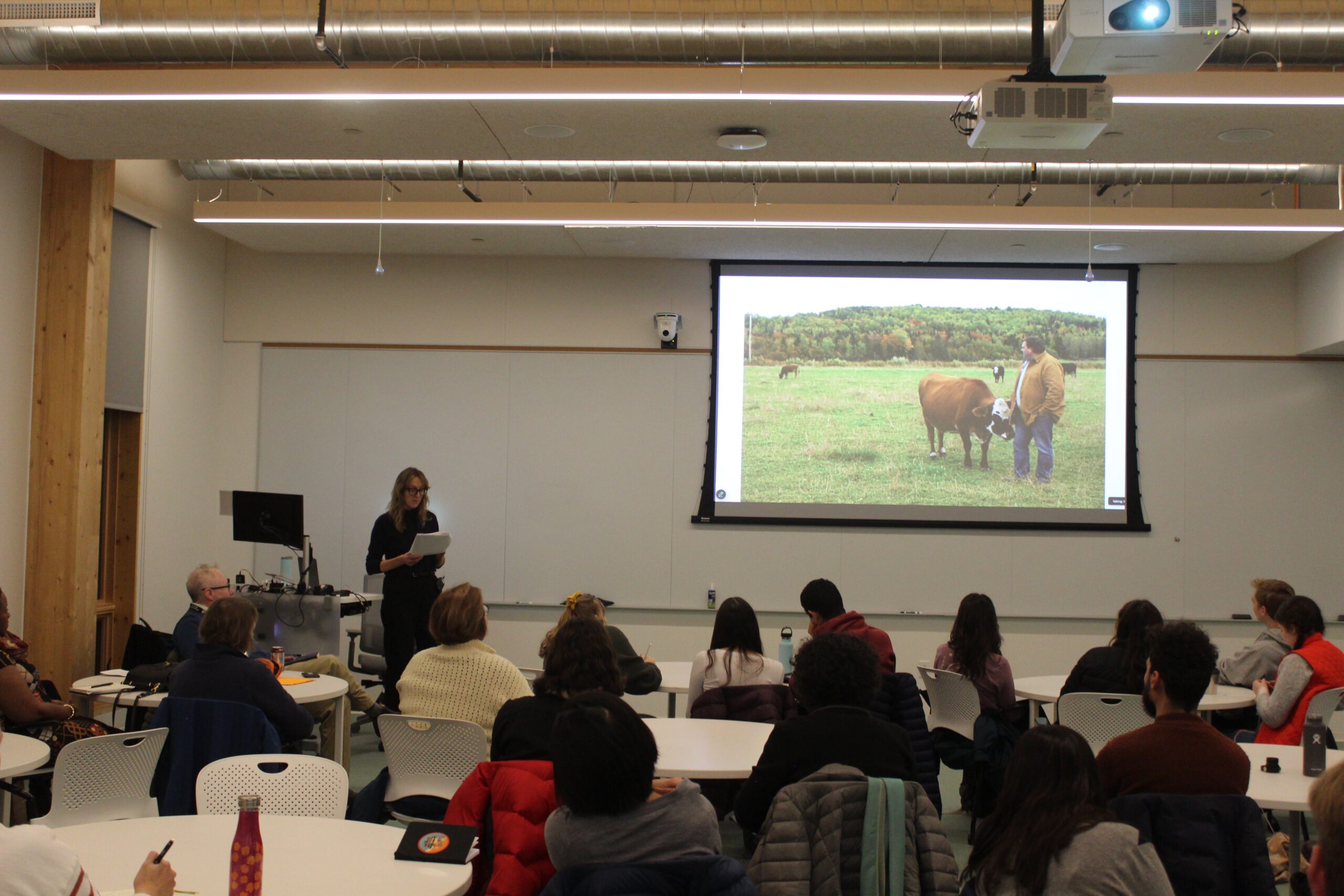Kate Olson speaks on climate change’s impact in Maine and ethnographic methods
December 6, 2024
 Carolina Weatherall
Carolina WeatherallOn Tuesday, Adjunct Lecturer in Environmental Studies Kate Olson spoke to a packed room of students, faculty and community members in Mills Hall about climate change and its impacts. Olson’s talk, hosted by the Department of Environmental Studies, focused on the effects of climate change in Maine and explored how connecting with a place can be incredibly important in the face of climate despair.
Olson, a writer and educator, is a Tribal Climate Equity Fellow at the U.S. Department of Agriculture Northeast Climate Hub. She also co-teaches Introduction to Environmental Studies with Assistant Professor of Environmental Studies and Government Shana Starobin this semester.
During the talk, Olson read excerpts from her forthcoming book, “Living Change: Finding Place in a Warming World.” She shared stories of her experiences with people across Maine who are impacted by climate change.
She began with an anecdote from her conversation with a fisherman named Lyman, who bemoaned the decline in the numbers of migrating monarchs as a sign of climate change. Olson cited this interaction, which occurred outside of a diner in Portland, as a moment in which she understood the impact that climate change would have in Maine.
“I know that the place where I [was] sitting next to the diner will be underwater this century,” she said.
Olson first came to Maine in 2015 to do research as a graduate student. Working on her dissertation, she decided to interview farmers, fishers and foresters to understand climate change from the perspective of people who worked the land and sea.
“I wanted to see what people on the ground saw, people who lived intimately with the natural world, people who long had,” Olson said. “[I wanted] to learn about what climate change meant to them and how it manifested in their lives.”
After reading excerpts about her interactions with other Mainers, Olson discussed the impact that climate change will have on the state. Maine, due to its northern location, is considered a climate haven—a place less likely to be catastrophically harmed by climate change. However, she said, even Maine isn’t safe from the effects of climate change, noting that the Portland diner where she talked with Lyman had already flooded twice since her visit.
“Even in this so-called climate haven, the edges between reality and fiction are blurring,” Olson said. “I could not have imagined that simply this future will become reality. There is nowhere to move.”
Shortly into the talk, Olson posed a question to the audience about climate change in Maine, facilitating discussion about what it feels like to live through this change.
“What does it feel like to sit with and feel these local manifestations of the changing climate? What does it feel like to think about this?” she said.
Olson discussed how, as a social scientist and ethnographer, she was taught to remain at arm’s length from those whom she was studying. However, Olson says, she became disenchanted with research that was disconnected from realities on the ground.
“Research that was separated from its place simply did not feel good and did not make sense in a changing climate,” Olson said. “My own life is impossibly caught up with the climate crisis.”
Olson aimed to address this by changing her methodology and using more traditional Indigenous methods of looking at the relationships between humans and their environment.
“Connecting ethnographic methods of immersion with Indigenous research methods starts from a recognition of our entailments, our relations with each other and the rest of nature,” she said. “This methodological shift has led me to see this place and its climate catastrophes quite differently.”
Olson ended her talk by discussing the historical oppression and marginalization of Indigenous peoples throughout American history, arguing that the current climate crisis is an outgrowth of centuries of colonialism and exploitation.
“We will not survive the climate crisis unless we face, dismantle and unsettle the logics of taking and separation which are left,” Olson said. “We may not be trapped by these histories, but we might learn to be accountable for their continual unfolding.”
Asha Adiga-Biro ’28 attended the talk and is taking Olson’s co-taught environmental studies class this semester. She appreciated Olson’s sentiments about how interpersonal relationships can help bridge ideological gaps surrounding climate change.
“[I learned] how important relationships are when working together to be able to avoid climate change and lessen [its] effects,” Adiga-Biro said. “Reinforcing relationships [helps] when you’re trying to figure out solutions.”

Comments
Before submitting a comment, please review our comment policy. Some key points from the policy: